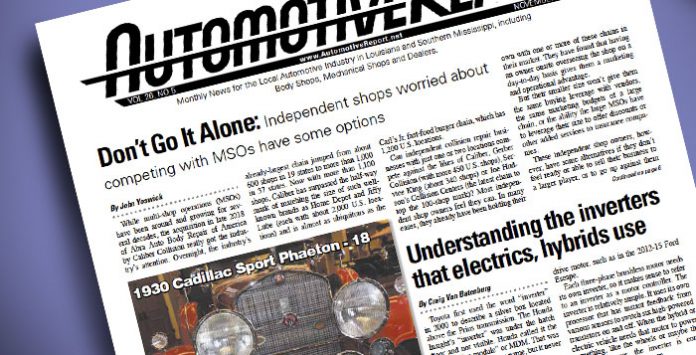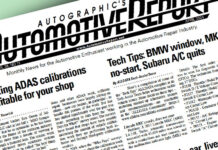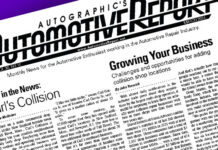Independent shops worried about competing with MSOs have some options
By John Yoswick
While multi-shop operations (MSOs)have been around and growing for several decades, the acquisition in late 2018 of Abra Auto Body Repair of America by Caliber Collision really got the industry’s attention. Overnight, the industry’s already-largest chain jumped from about 600 shops in 19 states to more than 1,000 in 37 states. Now with more than 1,100 shops, Caliber has surpassed the half-way mark of matching the size of such well-known brands as Home Depot and Jiffy Lube (each with about 2,000 U.S. locations) and is almost as ubiquitous as the Carl’s Jr. fast-food burger chain, which has 1,200 U.S. locations.
Can independent collision repair businesses with just one or two locations compete against the likes of Caliber, Gerber Collision (with more 450 U.S. shops), Service King (about 340 shops) or Joe Hudson’s Collision Centers (the latest chain to top the 100-shop mark)? Most independent shop owners feel they can. In many cases, they already have been holding their own with one or more of these chains in their market. They have found that having an owner onsite overseeing the shop on a day-to-day basis gives them a marketing and operational advantage.
But their smaller size won’t give them the same buying leverage with vendors, the same marketing budgets of a large chain, or the ability the large MSOs have to leverage their size to offer discounts or other added services to insurance companies.
These independent shop owners, however, have some alternatives if they don’t feel ready or able to sell their business to a larger player, or to go up against them alone.
The franchise route
Perhaps the biggest step away you can take from going it alone without selling your business is signing a franchise agreement.
“We’d been in ‘20 groups’ and knew a lot of collision shop owners around the country, so we regularly got a good snapshot of where the industry was and where it was going,” John Kimpton, co-owner of Fix Auto Springfield, said of his decision, along with his business partner, to become a Fix Auto USA franchise. “We knew if we were going to do just collision, we needed a ‘big brother.’ That’s what really prompted us to look into Fix Auto. We did our research and it was actually an easy decision to make.”
Kimpton said in their time as a Fix Auto franchise, the shop has doubled its collision repair sales, thanks in part to insurer direct repair agreements Fix Auto negotiates for its shops.
“It allows us to focus on the cars and the customers,” he said. “They help build the relationships, and then we cement those relationships.”
When you join a franchise organization like CARSTAR, Fix Auto USA or 1Collision Network, you remain the owner of your business. But you do give up some control in order to help the group as a whole benefit. Perhaps the most difficult aspect of becoming a franchisee for some owners is giving up their business name. In the past, for example, CARSTAR allowed its franchises to tuck the “CARSTAR” moniker almost anywhere within the company’s existing name. Newer franchise agreements may require their name come first, followed by some indication of your geographic location (i.e. “CARSTAR Yourcityname”).
Franchise agreements also come with requirements for the “look” of your business: using approved colors, signage, marketing slogans or jingles, website content, etc.
Franchise fees vary, and are often based on your top line sales. Belonging to a franchise can include other “costs,” such as required use of particular vendors, or attendance at regional or national gatherings.
But the franchises also can offer you far greater buying leverage and discounts than you will have as a stand-alone operation. They offer proven business and production operational procedures, comparisons of key performance indicators among franchisees, marketing materials and name recognition. They can negotiate franchise-wide agreements with insurance companies to help bring work to your door — though you do have to accept the terms they’ve negotiated.
Not insignificantly, they also give you a chance to network and learn from other successful business owners.
“As a smaller independent, I don’t know if I could make it without being part of CARSTAR,” said Dave Jacobus of Jacobus CARSTAR in Vancouver, Wash., a franchisee for more than 15 years. “There’s the buying power, the national support. And it’s nice to be able to pick up the phone and talk to someone you know in St. Louis or wherever and bounce something off of them. That’s what is really great about it, building those relationships.”
Franchisees also are increasingly acquiring or adding new locations of their own, often with the guidance offered by other multi-location franchisees in the group.
CARSTAR is the largest and fastest-growing of the franchise organizations, with more than 650 locations in North America and a stated goal of 1,000 by the middle of 2021 (though historically it hasn’t always hit its stated growth goals).
Fix Auto USA has more than 125 locations (concentrated primarily in the West and upper Midwest), though the “Fix Auto” brand also has been established in countries around the world. The franchise’s U.S. shop count took a hit earlier this year when in April Gerber Collision acquired seven Fix Auto shops in Oregon and Washington from owner Noel Pennington, and a few months later, Caliber Collision acquired four Fix Auto shops in Nevada from owner Jeff Bagley. But that also offers a good indication that a franchise agreement won’t put you out of consideration for acquisition by one of those larger players, if at some point you want to sell your business.
1Collision Network is another franchise organization with about 50 locations in about a dozen states. This fall, it added a human resources benefits program to offer its network of shops such things as a 401(k) plan, payroll services, national group health and life insurance, and some recruiting services.
The “loose affiliation” route
Not interested in changing your company name or sacrificing any of your hard-earned reputation in your market? There are some opportunities to join some looser-knit groups that, like a franchise, can help you gain some level of the advantages of larger collision businesses.
Perhaps the easiest is by joining a local, state or national trade association. For annual dues that are usually just a few hundred dollars, you can gain access to discounts on such business expenses as credit card processing, medical or workers’ compensation insurance, tools and equipment, retirement plans, office supplies and more. Well-run associations can give you access to training, ways to interact with other shop owners who may have overcome business challenges you are facing, and a good first place to call when you need some assistance. Check the websites of the three largest associations — the Alliance of Automotive Service Providers (AASP), the Automotive Service Association (ASA), the Society of Collision Repair Specialists (SCRS) — to check out their offerings and listings of their regional or state affiliated associations.
Another way to avoid “going it alone” is by joining a “20 group,” a type of mini-association of similar-sized collision repair businesses from different markets — who thus are not competitors — who meet throughout the year to compare financial and business performance, share ideas, and motivate one another to improve. These groups sometimes become loosely-knit “buying groups,” negotiating a discount with a vendor for all of the 20 group members who choose to buy that vendor’s product or service.
Qualifying for an automaker’s collision-shop certification programs is another way independent shops can gain greater access to automaker information and national marketing efforts. The fees and requirements for these programs vary widely, and using the affiliation to bring in business still usually requires that you work to make consumers in your market aware of what your OEM certification means to them. Although shops report mixed reviews as to the return on investment they feel they are getting from OEM certification, almost all agree that it is likely to improve as vehicle telematics give the automakers more information about drivers, including first access to them when an accident occurs.
One group connected with some automaker shop-certification programs is the “Assured Performance Network (www.assuredperformance.net), a national organization that can offer a variety of marketing and technology services and co-op-like buying opportunities. Among the features it offers is a repair documentation system that enables a shop to create and maintain “efficient electronic proof of how the vehicle was repaired, by whom and with what,” which can lead to improved quality and decreased liability exposure.
Assured Performance Network members also can access a “Pro Forma modeling tool” that assists a shop in conducting “what if” calculations of the likely financial impacts of making certain investments (in equipment, for example) or other strategic changes to their business model.
Another network working to tie together independently-owned OEM-certified shops is the “Certified Collision Group.” With shop membership in 39 states, CCG offers a variety of marketing and group buying programs.
“CCG partners retain the strength of their own individual brands, and complete control of their businesses, while gaining the significant scale opportunities of a national network providing proven business development, procurement purchasing power, and industry relations benefits,” CCG’s website (https://certifiedcg.com/) states.
Industry analysts almost universally agree that independent collision repair businesses with one or two locations can continue to succeed, but they are likely to continue to face greater competition from larger MSOs. A franchise agreement, or participation in one or more of the looser-knit affiliations, can help give a psychological or business boost to stand-alone shops concerned about whether they will be able to compete. •
John Yoswick, a freelance writer based in Portland, Ore., who has been writing about the automotive industry since 1988, is also the editor of the weekly CRASH Network (www.CrashNetwork.com). He can be contacted by email at john@CrashNetwork.com.



